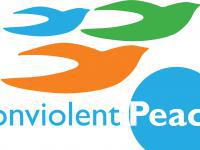Armed and Unarmed Peacekeepers
 People often ask me what the difference is between the UN Peacekeepers (Blue Helmets) and NP’s peacekeepers. First, let me be clear. NP is not in principle opposed to armed peacekeeping. I personally believe it is vital in a number of situations e.g. the Goma area of the Democratic Republic of the Congo. Rather than competing, unarmed civilian peacekeeping (UCP) is a different tool and can be applied in many conflicts where UN peacekeepers are not present or needed as in Mindanao. And, UCP with its sharp focus on the protection of civilians can complement armed peacekeeping, as in South Sudan.
People often ask me what the difference is between the UN Peacekeepers (Blue Helmets) and NP’s peacekeepers. First, let me be clear. NP is not in principle opposed to armed peacekeeping. I personally believe it is vital in a number of situations e.g. the Goma area of the Democratic Republic of the Congo. Rather than competing, unarmed civilian peacekeeping (UCP) is a different tool and can be applied in many conflicts where UN peacekeepers are not present or needed as in Mindanao. And, UCP with its sharp focus on the protection of civilians can complement armed peacekeeping, as in South Sudan.
Yet, our working premises are very different. Armed peacekeeping relies on threat and dominance for deterrence. Unarmed peacekeeping relies on relationships and ongoing communication with the communities and conflicting parties.
NP and an Indian contingent of UN peacekeepers both work in Pibor, in Jonglei state of South Sudan. As described in an earlier blog, we coordinate patrols of the Kandako area with UN Peacekeepers and the UN Police to help prevent sexualized violence. In fact, this model of coordinated, routine patrolling in conjunction with community groups is working so well that the UN is considering replicating it in other parts of the country.
We maintain a good relationship with the Indian peacekeepers. We share strategies and information vital to keeping the peace and protecting civilians. The peacekeepers stress how they rely on us for grassroots information.
On the day before Independence Day (July 8), Masa, an NP peacekeeper from Japan, and I were invited to the UN peacekeepers’ compound for lunch. Masa is well known and highly visible throughout Pibor. He plays football with the local boys and stops at the local shop to share shisha (water pipe). We greeted people as we walked the kilometer between our camp and the UN compound.
The commanding major greeted us and soon we were sharing chai. Next we were served curries, dal and chapattis. For dessert, we had ice cream; altogether, a delectable feast for those relying on the staples of rice, beans, sorghum, peanut butter bread with occasional goat or fish.
We talked about what each would be doing on Independence Day. It would be a low key holiday. We would be attending the celebrations and community football game as well as visit Kandako. The major had decided to keep his men in quarters because of the possibility of random shooting by drunks.
After the pleasant meal, the major offered us a ride home. Why not? It was hot.
He summoned a jeep and we quietly rode back over the same route that had been a pleasant walk 90 minutes earlier, but now feeling a trifle awkward and more distant as we waved at the people we passed.
Mel Duncan
